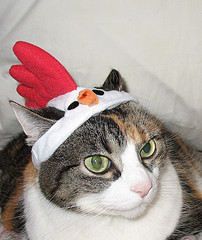Chicken Breeder: Blame Higher Poultry Prices On Fat, Impotent Roosters
While we’re not exactly up to date on the fertility issues facing roosters (and whether or not they can actually be impotent, per se), Aviagen Group says it has identified a genetic issue that’s affecting the standard Ross male’s fertility, reports Reuters.
Aviagen and one of its largest customers, Sanderson Farms, say other possible causes were ruled out before concluding that the genetic issue is the reason for the roosters’ reduced fertility.
Aviagen provides hens and roosters for breeding to chicken producers, which then breed the birds and hatch their eggs to raise for meat. Sanderson noted a dip in its chick output last year involving the Ross roosters, says its chief financial officer, with fewer eggs hatching from the Ross breed than usual.
Aviagen sent a bunch of scientists to Sanderson to check out the reduction, and subsequently acknowledged that a tweak it made to the breed’s genetics — which is common, reportedly, in the poultry industry — made the birds “very sensitive” to being overfed. And when roosters aren’t feeling attractive, well, they don’t want to get it on. Or something.
“We fed him too much. He got fat. When he got big, he did not breed as much as he was intended to,” Sanderson Farms’ CFO Mike Cockrell (I know, right?) explained. “The fertilization went way down, and our hatch has been way down.”
Aviagen’s spokeswoman says the company has replaced the Ross breed with a new one, in the hopes that they’ll produce better. There are no firm numbers yet on the outcome, but she adds “results to date are favorable.”
No pressure though, new roosters. Just let the mood lighting and Marvin Gaye do the trick so we can all eat cheaper.
*Thanks to Ashley for the tip — you are a wonder and a delight.
Exclusive: Roosters’ fertility problem hits U.S. chicken supply, lifts prices [Reuters]
Want more consumer news? Visit our parent organization, Consumer Reports, for the latest on scams, recalls, and other consumer issues.


